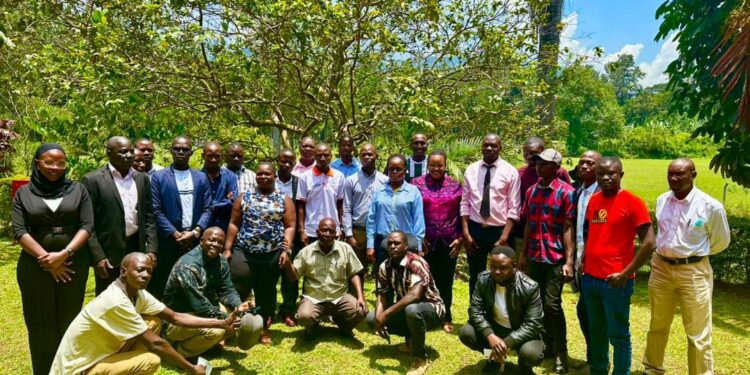Uganda’s Ministry of Health has joined forces with UNICEF to launch a critical house-to-house mass polio vaccination campaign targeting 2.7 million children under five in 49 districts.
The first phase of the campaign to cover all districts under the traditional Busoga, Bukedi, Bugisu, Teso and Karamoja sub regions will take place from 3-6th October, 2024.
This initiative kicked off in Mbale City, Eastern Uganda, where experts first identified the outbreak.
As can be recalled, Uganda first confirmed a circulating Derived Polio Virus type 2(cVDPV2) on 31st May, 2024 from one sample collected on the 7th May, 2024 from the sewage plant in Doko in Mbale City which is one of the sentinel environmental surveillance sites in the country.
Ms Emily Cheptoek, the Principal Nursing Officer from the Ministry of Health headquarters, who was the lead facilitator, told the 50 participants drawn from the electronic and print media including radio presenters the critical role the media plays.
She said a single case of polio virus detection can trigger a national response and be considered an epidemic because polio virus is highly contagious, spreading through fecal-oral contact, contaminated water, or food.
“…one case can quickly lead to multiple infections; it can spread rapidly among vulnerable populations, especially in areas with low vaccination rates or inadequate sanitation…” Cheptoek stressed.
Reminding the attentive journalist that polio can cause irreversible paralysis, disability, or even death, the soft-speaking Cheptoek said the World Health Organization (WHO) has designated polio as a disease targeted for global eradication, adding a single case undermines these efforts.
As part of public health protocol, the WHO recommends that any confirmed polio case triggers an immediate response to prevent further transmission.
She said responding aggressively to a single case helps prevent widespread transmission because polio outbreaks have serious social, economic and political implications.
In Uganda’s case, the government’s proactive response, alongside partners like UNICEF to the detected polio case demonstrates commitment to protecting vulnerable populations, maintaining global health security and upholding international health standards.
Another facilitator, the Mbale District Health Educator Ms Agnes Masagwai told reporters the campaign’s primary focus is on ensuring the health and well-being of young children, who are often the most vulnerable to outbreaks.
“…its heartbreaking to see a disabled child or children in the current era where facilities and services like vaccinations are easily available, moreover free of charge, so let’s join hands…” Agnes Masagwai pleaded.
By going door-to-door, Masagwai said the approach enables the health workers to reach even the most remote or hard-to-reach communities.
She told reporters the second phase will be conducted on 7th- 10th November, 2024.
One of the communications officers from the Ministry Jolly Atwine Twongyeirwe took time to explain some isolated cases of resistance to polio vaccination as tied to cultural and religious background.
Some communities mistakenly believe that vaccination is un-religious (against their scriptural teachings or doctrines), while others say vaccines contain harmful chemicals.
Sections also say the vaccines are a ploy by the western world to depopulate Africa.
“…so the best person or people to clarify or deflect these myths and misconceptions by giving clear and accurate information so that Uganda becomes a polio-free country…” Jolly Atwine Twongyeirwe appealed.
But the World Health Organization (WHO) has extensively studied and verified the safety and efficacy of polio vaccines.
According to WHO, polio vaccines have been deemed safe and effective in preventing polio, with a high level of protection against paralytic polio.
What You Need To Know:
WHO continuously monitors vaccine safety, and reports have shown that polio vaccines have a strong safety record.
UNICEF’s collaboration with Uganda brings extensive expertise in child health, having worked tirelessly to improve maternal, newborn, and child survival rates globally.
Their efforts focus on strengthening health systems, combating diseases, and promoting health education.
In Uganda, UNICEF has been instrumental in supporting the government’s response to various health challenges, including the recent Mpox outbreak.
This partnership has helped mobilize resources, expertise, and funding to address pressing health concerns.
The campaign’s success relies on the collective efforts of health workers, community leaders, and families.
By working together, they can ensure that young children receive the care and protection they need to thrive.
This initiative recognizes the power of community journalism in empowering communities and promoting social change.
By leveraging media platforms, journalists can bridge the information gap and facilitate informed decision-making.
Effective community journalism involves training community members to tell their own stories, collect news, and communicate challenges and opportunities to wider audiences.
According to the organizers, the key objectives of the meeting were to equip them with accurate information to effectively sensitize communities for improved health.
It was also to encourage reporters and radio/TV presenters to use their various platforms to reach out to communities to foster informed decision-making.
Do you have a story in your community or an opinion to share with us: Email us at editorial@watchdoguganda.com









